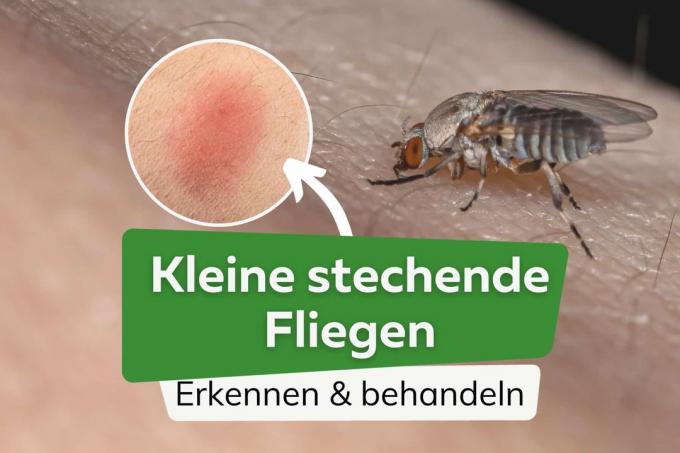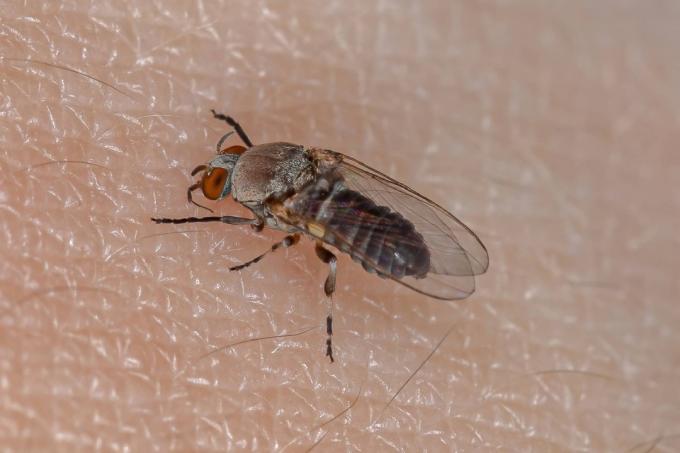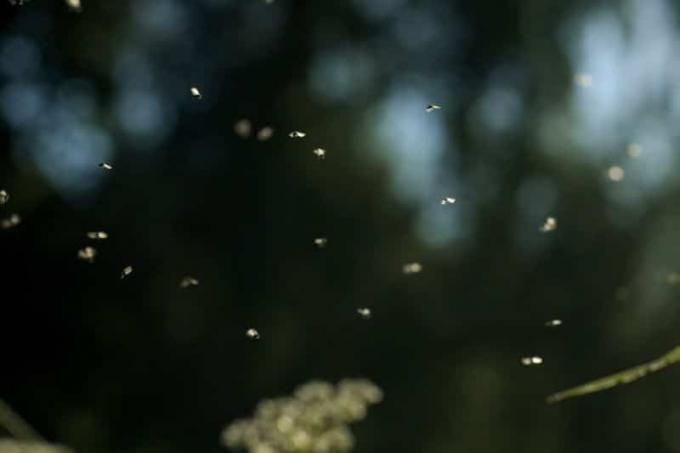
If you suddenly notice redness and painful areas on your body after a summer hike, it is usually the tiny little flies that bit you that are to blame. How to react correctly to black flies.
In a nutshell
- biting black flies
- cause itchy, painful swelling
- Females suck blood for their eggs
- risk of inflammation
- often in muggy warm weather
Table of contents
- Identify blackflies
- bite or sting
- Treat blackfly bite
- Prevent black fly bites
- frequently asked Questions
Identify blackflies
Tiny little flies that bite are mostly black flies (Simuliidae). They are a family of dipterans. You belong to the mosquitoes, but look more like tiny little flies. More than 2400 species are known worldwide. About fifty species live in Germany. You can recognize them by the following characteristics:

- Size: two to six millimeters
- Build: hunchbacked, stocky, short legs
- Body color: black, dark blue or dark gray
- Wings: Broad, rounded, colorless or clouded with smoky
- proboscis: short
bite or sting
Only the female black flies leave behind painful swellings. The tiny little insects don't sting, but rather saw open the skin of warm-blooded animals with their sharp mouthparts and suck the blood out of the wound. So it's more of a bite than a sting. The females need the blood to form their eggs with the proteins it contains. Usually, like the males, they feed on flower nectar.
A notice: Black fly bites are very itchy at first. However, when you scratch, the areas immediately swell, become red, then bluish and painful. The small insect can cause large hematomas.
Wild animals and grazing animals such as horses, goats and cows. These offer large attack surfaces and are usually quite still. Human blood is also of interest in blackflies. Scientists suspect that the decline in pastoralism means that humans are increasingly being considered as hosts for blackflies.
Danger: When the black fly bites, anticoagulant substances and histamine get into the wound. Under certain circumstances, these can cause severe physical reactions.
Treat blackfly bite

If the symptoms on one black fly bite advise, act quickly:
- Disinfect the puncture site.
- Don't scratch! Scratching can cause dangerous inflammation.
- Cool the puncture site with cooling pads or water and apply an ointment to relieve itching.
- Watch the wound. Go to the doctor if
- the swelling does not go down
- red streaks appear from the wound
- Fever, chills or headache occur
- rashes become visible
A notice: Red streaks forming from the wound can be signs of blood poisoning. Blood poisoning is life-threatening. See a doctor immediately!
Prevent black fly bites
The small insects are mainly active in the early morning and late afternoon. They appear in swarms from May to September. Black flies prefer dark places, such as under trees. They often stay on pastures and near flowing water, where they also lay their eggs. In search of blood, they also cover longer distances and fly into the gardens and parks.

Tip: Hot summers with high humidity provide perfect conditions for black flies to multiply. Wear long clothing, especially in hot, humid weather near water or when hiking along pastures. The small bloodsuckers cannot penetrate these.
frequently asked Questions
Mosquitoes bite small veins with their proboscis. They leave a barely visible puncture mark. Black flies, on the other hand, scratch the skin with their sharp mouthparts and suck up the escaping blood with their proboscis. Therefore, the injuries are greater.
The species native to Germany are not considered carriers of diseases. However, there is a risk of inflammation, which can lead to serious diseases.
The small black insects do not make any noise perceptible to the human ear. They are so small that it goes unnoticed when the insect settles on the skin. Even the puncture does not initially cause a reaction. By the time the redness shows up, the culprit is long gone.
